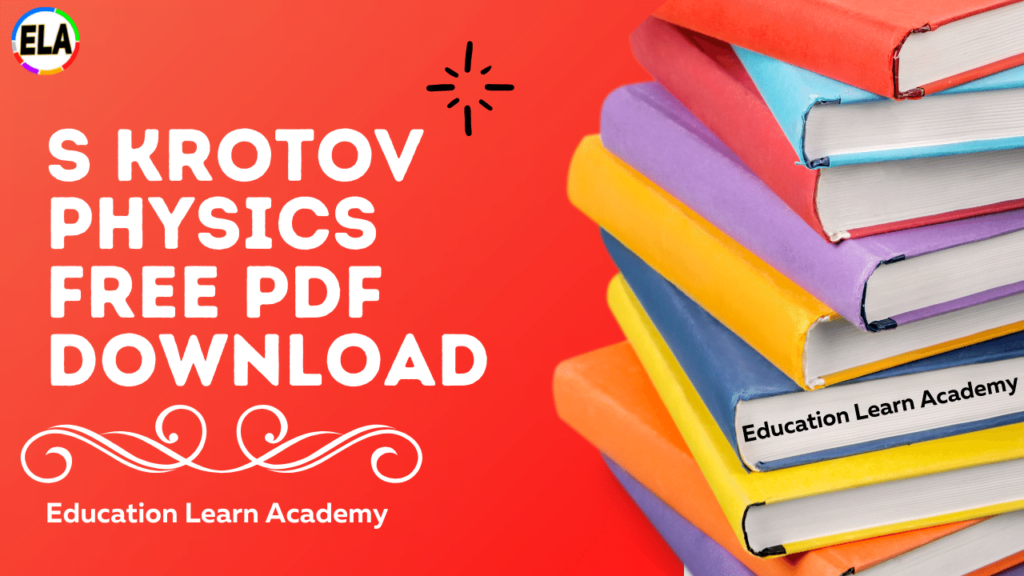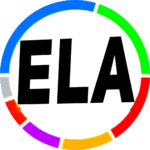S Krotov Physics Solution: Students can refer to S Krotov Physics Solutions provided below. These solutions have been developed based on the latest S Krotov Physics book for the current academic year. Please click on the links below to download the solutions in PDF format

| S Krotov Physics Solution 1.1 to 1.61 |
| S Krotov Physics Solution 1.71 to 2.10 |
| S Krotov Physics Solution 2.24 to 4.18 |
Benefits of using S Krotov Solutions
S Krotov Physics Solutions are being considered as one of the best books for students. Students like these books a lot. It has been always advised by expert teachers that they should study S Krotov books on a regular basis. This will help them to build a stronger understanding of the concepts. Having a strong base and a thorough understanding of all topics is really useful for students.
They will be able to score good marks in their exams by reading S Krotov textbook. Students should go through the solutions provided on our website. As students struggle to find answers to various problems given at the back of each chapter. We have provided here a full database of all solutions for all classes in easy to download format.
S Krotov Solutions
All solutions for S Krotov are provided in PDF format. Students can easily download them and read by taking printouts. This will help you to study offline without the internet. The students should study S Krotov Questions and answers. Students will be able to like and understand all topics properly. Because going through the answers is very important. And these answers will help you a lot.
You can refer to our Textbook Solutions page for more solutions as here we have the biggest database of solutions for all chapters in books written by various publishers. All solutions are available for free for students. Where can I download S Krotov Physics Solutions?
You can download S Krotov Solutions from our website and have provided all solutions in PDF format. You can download everything freeIs S Krotov an important book?
Yes, all concepts and topics are explained in a very useful manner in this book written by S Krotov and we have provided all questions and answers for you to download.
SS Krotov Mechanics Solutions
Mechanics chapter of SS Krotov Aptitude Test Problems in Physics Solutions explains to you about the measuring units, also known as SI units. Some of them include Metre, Kilogram, Second, Ampere, Kelvin, Mole and Candela. The chapter also elaborates on the system of units such as CGS system, FPS system, MKS system, SI system, vector and scalar quantities, general points regarding vectors, addition and subtraction of 2 vectors, word, energy, torque, the moment of force, energy, angular momentum, Planck’s constant, rotational impulse, power and luminous flux.
S.S. Krotov Mechanics section also educates you on fundamental quantities such as length, mass, time, electric current, thermodynamics temperature, amount of substance and luminous intensity. Next, you will learn mechanics and kinematics, basic definitions associated with the same, motion in one, two and three dimensions, uniformly accelerated motion, non-accelerated motion, graphs and relative motion uniformly. Further, you will also be learning about the acceleration due to gravity, which includes the symbol, dimensional formula, SI unit, value of g in SI, value of g in CGS.
Krotov Mechanics chapter further explicitly discusses the types of motion involving rotation such as rotation about a fixed axis, rotation about an axis of rotation, and rotation about an axis in the rotation. It also covers concepts such as the linear kinematics parameters and angular kinematics parameters, namely, position and displacement. This chapter also teaches you about instantaneous velocity, average acceleration, instantaneous acceleration Newton’s law of gravitation, acceleration due to gravity, gravitational potential, the relationship between the gravitational field and potential, gravitational potential energy, binding energy, circular motion principles for satellites and Kepler’s law.
Here, you will also learn about Kepler’s law that explains to you about the centripetal and centrifugal force. This chapter will further teach you how to calculate the centripetal force. This force also includes bounded motion and unbounded motion. The chapter explains to you how each body in the universe attracts other bodies towards it with gravitational force, and the chapter also teaches you why source mass is heavier, and test mass is lighter.
In this chapter, you will gain an in-depth understanding of the three laws of motion. Here you will also get to know what is the relationship between forces which are acting over the body and the body motion. The wide range of questions in this chapter includes scenario-based questions, diagrammatic questions, theorem based questions, situation questions and direct questions.
S.S. Krotov Mechanics chapter has a total of 116 questions. They holistically cover all significant concepts. Our SS Krotov Science for Everyone-Problems in Physics Solutions answer all questions in a step by step manner and in an easy to understand language.
Recent Post
- All in One Solutions Class 8 to 10 free PDF Download
- All In One Solutions For Class 10 Free Pdf Download
- All In One Solutions For Class 9 Free Pdf Download
- All In One Solutions For Class 8 Free Pdf Download
SS Krotov Heat and Molecular Physics Solutions
Heat and Molecular Physics of SS Krotov Science for Everyone Solutions educate you on the quantity of heat, thermal expansion, the concept of an ideal gas, gas laws, ideal gas equation, degree of freedom, the efficiency of a cycle, heat engines, refrigerator, zeroth law of thermodynamics, the second law of thermodynamics, the internal energy of an ideal gas, the law of equipartition of energy, molar heat capacity, heat, phase changes, latent heat, heat transfer and the kinetic theory of gases.
Further, the chapter introduces you to electromagnetic waves, electromagnetic spectrum, applications of electromagnetic waves, the intensity of an electromagnetic wave, speed of electromagnetic waves in free space, the mathematical representation of electromagnetic wave, graphical representation of electromagnetic wave, adiabatic calorimeters, reaction calorimeters, bomb calorimeters (constant volume calorimetry), constant pressure calorimetry and differential scanning calorimeters.
The chapter also deals with the nature of sound, which includes the frequency of sound, the wavelength of sound, the amplitude of the sound, speed of sound and reflection of sound. Here you will also learn significant terminologies such as amplitude, period, wavelength, frequency, wave velocity, phase or phase angle (o), phase difference, path difference and time difference in details with supporting examples and requisite diagrams.
The different types of question styles in this chapter include scenario-based questions, diagrammatic questions, theorem based questions, situation questions, short questions, long questions and direct questions. This chapter has a total of 42 questions. Our SS Krotov Solutions are prepared by our expert Physics teachers in a methodical and logical manner to make learning quick, easy and effective.
SS Krotov Electricity and Magnetism Solutions
Electricity and Magnetism of SS Krotov Physics Solutions explain to you about electromotive force (EMF) and voltage, resistance and resistivity, the origin of resistivity, the temperature dependence of resistivity, electrical current, resistance and Ohm’s law.
Here you will also learn about the temperature dependence of resistivity and resistance, the battery and the electromotive force, heating effect of currents, the grouping of cells, electrical measuring instruments, chemical effect of current, thermoelectricity, confines of Ohm’s law, superconductivity, resistors in series and in parallel and electric circuits and Kirchoff’s law.
The chapter explicitly elaborates on electric charges, conductors and insulators, charging of a body, Coulomb’s Law, electric field, electric potential energy, electric potential, the relationship between electric field and potential, equipotential surface, electric dipole, Gauss’s law, properties of a conductor, the attraction of paper to a charged scale, the apparently spontaneous explosion of grain silos, the damage of electronic components during manufacturing, photocopier & laser printer operation, electric field and potential due to charged spherical shell or solid conducting sphere and electric field and potential due to a solid sphere of charge.
Further, the chapter also educates you on energy stored in a charged conductor, capacitors, mechanical force on the charged conductor, capacitors in series and parallel, two laws in capacitors, energy density, C-R circuits, parallel plate capacitor, spherical capacitor and cylindrical capacitor.
The chapter also throws light on the work done by a capacitor, determining the value of capacitance, energy stored in a capacitor, standard units of capacitance, capacitance of a parallel plate capacitor, methods of finding equivalent resistance and capacitance.
Here you will also gain knowledge on magnetic force on a moving charge (Fm), the path of a charged particle in a uniform magnetic field, the magnetic force on a current-carrying conductor, magnetic dipole, magnetic dipole in a uniform magnetic field, Biot- Savart law, and Ampere’s circuital law.
Further, you will learn the magnetic field of a moving point charge, the force between parallel current-carrying wires, magnetic poles and bar magnets, Earth’s magnetism, vibration magnetometer, magnetic induction and magnetic materials, some important terms used in magnetism, properties of magnetic materials and explanation of paramagnetism, diamagnetism and ferromagnetism.
Here you will also understand the growth and decay of current in an L-R circuit, oscillations in the LC circuit and induced electric field. The chapter also talks about magnetic flux, Gauss law, induced current, induced charge, induced EMF, induced current, self-inductance and mutual inductance.
This section has a total of 62 questions that comprehensively cover all corners of the chapter. SS Krotov Solutions for Aptitude Test Problems in Physics answer all problems of this section in detail and with relevant diagrams and examples wherever necessary. They are easy to understand and fully accurate.
USEFUL LINKS
- Course Details Courses After 10th
- Diploma Courses
- Computer Courses
- Courses After 12th
- Courses After MBA
- Animation Courses
- Essay Writing
SS Krotov Optics Solutions
Optics is one of the most important sections of SS Krotov Book. Here, you will be reading about the nature of light, a few general points of geometric optics, amped oscillation in a circuit, logarithmic damping decrement, quality factor, vector diagrams of voltages, and the power generated in an AC circuit.
Here you will also learn about the equation of plane and spherical waves, wave equation, phase velocity, transverse waves in a string, Young’s modulus, the density of the medium, the tension of the string, linear density, volume density of energy of an elastic wave, energy flow density, standing wave equation, acoustical Doppler effect, loudness level and reflection of light.
The chapter also throws light upon regular reflection, irregular reflection, laws of reflection formula, angle of reflection and calculation of the angle of incidence, refraction of light, thin lenses, total internal reflection, Radio waves include radio propagation, wavelength, speed and frequency and radio communication as well. Here electromagnetic waves include wave equation, RADARS and intensity, refraction through the prism, optical instruments, photometry and angle of reflection.
This chapter also gives you details on the derivation of Young’s double-slit experiment, the position of fringes, the shape of fringes, the intensity of fringes, special cases, displacement of fringes and constructive, destructive interference, the single-slit diffraction which includes a single slit diffraction formula, the central maximum and diffraction pattern and intensity graph.
From this chapter, you will gain knowledge of dual nature of electromagnetic waves, electromagnetic spectrum, momentum and radiation pressure, De-Broglie wavelength of matter-wave, early atomic structures, the Bohr hydrogen structure, hydrogen-like atoms, X-rays, emission of electrons, photoelectric effect and reduced mass.
The wide range of question types in this chapter includes short answer questions, long answer questions, scenario-based questions, diagrammatic questions, theorem based questions, situation questions and direct questions. This chapter has a total of 20 questions. Our smart, systematic and strategic SS Krotov Science for Everyone Solutions to these questions are comprehensive and fully accurate.
